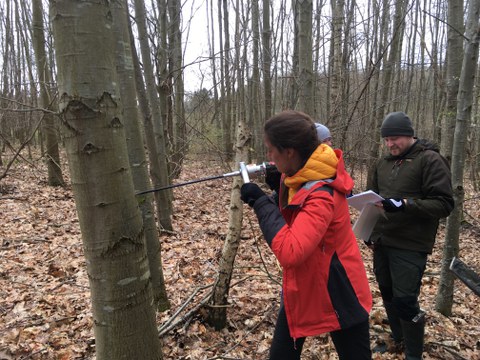Forschungsprojekte
Laufende Projekte:
µDYNAST: Ausbreitungsdynamik und mikrobielle Besiedlung der Spätblühenden Traubenkirsche
Teilvorhaben 1: Ausbreitungsdynamik, Wachstum und Einfluss auf die Vegetation
Die aus Nordamerika stammende Spätblühende Traubenkirsche wurde im 17. Jahrhundert nach Europa eingeführt und seit dem 19. Jahrhundert forstwirtschaftlich genutzt. Heute gilt sie aufgrund ihres hohen Ausbreitungspotenzials als invasiver Neophyt. Vor allem in lichten Waldbeständen verdrängt sie heimische Arten und hemmt die Verjüngung anderer Baumarten. Beobachtungen aus dem Müritz-Nationalpark zeigen, dass ältere Traubenkirschen an Vitalität verlieren, möglicherweise beeinflusst durch Standortbedingungen und Phytopathogene. Das Projekt µDYNAST untersucht die Ausbreitungsdynamik und mikrobielle Besiedlung der Art. Unser Teilprojekt fokussiert auf Ausbreitung, Wachstum und die Auswirkungen auf die Bodenvegetation sowie andere Baumarten. Ziel ist es, die Ausbreitungsdynamik und mikrobiellen Besiedlung der Traubenkirsche besser zu verstehen und Grundlagen für eine nachhaltige Waldnutzung sowie den Erhalt vielfältiger Waldökosystemleistungen zu schaffen.
Projektbearbeiter: Konstantin Weise
Kontakt: Marieke van der Maaten-Theunissen
Kooperationspartner: Professur für Forstbotanik, TUD
Finanzierung: BMLEH [Förderkennzeichen 2224NR009A]
Laufzeit: 10.2025-09.2028
ISOWALD: Kombinierte Isotopenanalysen zur Förderung der Forschung über klimaresiliente Wälder
Studien an der Rotbuche, der Orientbuche und ihren Hybriden
Die Rotbuche steht im Klimawandel vor großen Herausforderungen, insbesondere durch zunehmende Sommerdürreperioden, die Wachstum und Vitalität stark beeinflussen. Gleichzeitig rückt die Orientbuche als potenziell trockenresistentere Alternative in den Fokus, wobei die Anpassungsfähigkeit und Klimasensitivität dieser Art sowie von Hybriden beider Arten noch unzureichend untersucht sind. Im Projekt werden insbesondere kombinierte Isotopenanalysen von Sauerstoff und Kohlenstoff eingesetzt, um die Reaktionen der Bäume auf Trockenheit detailliert zu erfassen. Genetisch charakterisierte Bestände erlauben zudem die Verknüpfung von Wuchsdynamik und genetischer Veranlagung. Proben aus Deutschland und Griechenland sowie Hybriden zwischen Rot- und Orientbuche ermöglichen die Analyse intra- und interspezifischer Variation sowie potenzieller Beiträge der Orientbuche zur Erhöhung der genetischen Diversität der Rotbuche. Die Ergebnisse sollen das Verständnis der klimatischen Anpassungsmechanismen der Buchenarten vertiefen und wichtige Grundlagen für die Entwicklung klimaresilienter Wälder liefern.
Kontakt: Ernst van der Maaten
Finanzierung: Eva Mayr-Stihl Stiftung
Laufzeit: 10.2025-09.2028
Wald.Wissen.Wandel – Interaktives Lernen im Marteloskop
Künftige Forstleute müssen angesichts des Klimawandels Entscheidungen im Spannungsfeld ökologischer, ökonomischer und sozialer Ziele treffen können. Wald.Wissen.Wandel stärkt die praxisnahe Ausbildung, indem Studierende direkt im Wald Managemententscheidungen erproben und deren Auswirkungen reflektieren. Im Mittelpunkt stehen die Entwicklung zielgruppenspezifischer Lehrmaterialien sowie die Anlage zusätzlicher Marteloskopsflächen in Sachsen. Marteloskope sind vollständig vermessene Waldflächen, auf denen jeder Baum erfasst ist und forstliche Entscheidungen simuliert werden können. Über die „I+“-App des European Forest Institute sind diese Flächen virtuell zugänglich und können für Übungen, Fallbeispiele und Reflexion im Sinne des Flipped-Classroom-Prinzips genutzt werden. Studierende erarbeiten sich theoretisches Wissen vorab, wenden es praktisch im Wald an und reflektieren ihre Entscheidungen. Die Förderung unterstützt die Erstellung der Lehrmaterialien sowie die Anlage weiterer Marteloskope. Durch das bundesweite Marteloskopsystem lässt sich das Konzept über die TU Dresden hinaus verbreiten.
Projektbearbeiterinnen: Erik Nestler und Studierenden
Kontakt: Marieke van der Maaten-Theunissen
Finanzierung: Fonds DLL
Laufzeit: 09.2025-08.2026
ORIENT-BUCHE: Fagus orientalis als Alternativbaumart im Klimawandel - Identifizierung hochwertiger Saatgutquellen basierend auf genetischer und phänotypischer Charakterisierung
Teilvorhaben 5: Phänotypische Plastizität und genetische Anpassung in Wuchsmerkmalen der Rot- und Orientbuche
Die Orient-Buche wird von der Bund-Länder-Arbeitsgruppe „Forstliche Genressourcen und Forstsaatgutrecht“ (BLAG-FGR) als Priorität-1-Art eingestuft, da sie deutschlandweit ein Ersatzpotenzial für die Rot-Buche bietet. Vor diesem Hintergrund besteht ein unmittelbarer Forschungs- und Handlungsbedarf zur Erfassung ihrer genetischen und phänotypischen Variation. Unser Teilprojekt fokussiert auf die Analyse der Effizienz und Stabilität des wasserleitenden Systems von Orient- und Rotbuche sowie auf die Untersuchung der Wuchsdynamik beider Arten in Deutschland mittels dendroökologischer Methoden. Ziel ist es, die Anpassungsfähigkeit der Orient-Buche unter hiesigen Umweltbedingungen besser zu verstehen und damit eine Grundlage für eine nachhaltige Nutzung und gezielte Auswahl geeigneter Herkünfte zu schaffen.
Projektbearbeiterinnen: Katja Liedel, Elham Elzami
Kontakt: Ernst van der Maaten
Kooperationspartner: Georg-August-Universität Göttingen (Projektkoordination), Bayerisches Amt für Waldgenetik, FVA Baden-Württemberg, Thünen-Institut für Forstgenetik
Finanzierung: BMLEH [Förderkennzeichen 2223NR082E]
Laufzeit: 12.2024-11.2027
ArchaeoTin: Archäologie im Welterbe – Zinnbergbaulandschaften
Das grenzüberschreitende deutsch-tschechische Projekt ArchaeoTin vereint sechs Partnerinstitutionen aus Tschechien, Bayern und Sachsen, um den Zinnbergbau im Erzgebirge vom Beginn der Bronzezeit bis in die Gegenwart systematisch zu erforschen. Neben Gewinnung, Aufbereitung und Verarbeitung der Erze untersucht das Projekt auch die sozialen und ökologischen Folgen von 4.000 Jahren Bergbau. Die interdisziplinären Ergebnisse werden der Öffentlichkeit in Form einer wandergängigen Multimedia-Ausstellung in der UNESCO-Welterberegion Montanregion Erzgebirge/Krušnohoří präsentiert. Unser Teilprojekt konzentriert sich auf die historische Waldentwicklung. Mithilfe systematischer Untersuchungen historischer Holzkohlemeiler in ausgewählten Gebieten rekonstruieren wir vergangene Waldlandschaften und führen dendrochronologische sowie anthrakologische Analysen durch. Die gewonnenen Jahrringdaten tragen zudem zur Verbesserung der Referenzchronologien für Sachsen bei.
Das Projekt wird durch das Interreg-Programm Sachsen–Tschechien 2021–2027 des Europäischen Fonds für regionale Entwicklung (EFRE) gefördert. Die Gesamtkosten betragen 4.397.009,35 EUR, die EU-Förderung beläuft sich auf 3.517.607,45 EUR.
Projektbearbeiterinnen: Grit Neubauer, Henriette Schmidt
Kontakt: Marieke van der Maaten-Theunissen
Kooperationspartner: Landesamt für Archäologie Sachsen (Projektkoordination), Institut für archäologische Denkmalpflege Nordwestböhmen, Stadtverwaltung Ehrenfriedersdorf, Regionalmuseum Teplice, Ludwig-Maximilians-Universität München, Masaryk Universität Brno
Finanzierung: Interreg Sachsen – Tschechien 2021-2027
Laufzeit: 07.2023-06.2026
MultiRiskSuit – Baumartenempfehlungen und Klimarisiken in Deutschland
Angesichts des Klimawandels müssen Baumarten hinsichtlich ihrer Wachstumssensitivität und Anfälligkeit für Mortalität unter zukünftigen Bedingungen bewertet werden. MultiRiskSuit verbessert multikriterielle Eignungsempfehlungen für wichtige forstrelevante Baumarten in Deutschland, schätzt klimawandelbedingte Wachstums- und Mortalitätsrisiken ab und beurteilt die zukünftige Baumarteneignung. Im Fokus stehen Bergahorn, Birke, Rotbuche, Stiel- und Traubeneiche, Hainbuche, Weißtanne, Europäische Lärche, gewöhnliche Fichte und Waldkiefer. Dabei werden die Baumartenempfehlungen der Bundesländer verglichen und unterschiedliche Modellierungsansätze evaluiert. Die Modelle werden deutschlandweit auf Stichprobennetzwerken wie der Bundeswaldinventur, Bundeszustandserhebung und Waldzustandserhebung angewandt und flächendeckend in sogenannten „Nachbarschaftsregionen“. Ziel ist es, Aussagen über die Zukunftsfähigkeit der Baumarten für einen nahen (2021–2050) und fernen Zukunftshorizont (2071–2100) zu treffen. Im Teilprojekt „Modellierung der Mistelausbreitung und Wachstumsstabilität der Hauptbaumarten“ stehen drei Schwerpunkte im Vordergrund: die Weiterentwicklung eines Jahrring-Modells zur Untersuchung der Wachstumssensitivität aller forstrelevanten Baumarten in Europa, die Anwendung eines Mistel-Modells zur Abschätzung der Verbreitung der Mistel an der Kiefer sowie die Evaluierung der Baumarteneignung in Mecklenburg-Vorpommern.
Projektbearbeiter: Konstantin Weise
Kontakt: Marieke van der Maaten-Theunissen
Kooperationspartner: MultiRiskSuit-Konsortium
Laufzeit: 11.2022-10.2027
Abgeschlossene Projekte:
BucheTIG: Forschungsschwerpunkt Genetik und Dendroökologie der Rotbuche - Trockenstress, In-vitro-Kultur und Genomik
Teilvorhaben 2: Phänotypische Plastizität und genetische Anpassung in Rotbuche in Herkunftsversuchen entlang eines Umweltgradienten
Die Rotbuche ist die wichtigste heimische Laubbaumart in Deutschland und von herausragender ökonomischer und ökologischer Bedeutung. Im Rahmen des Verbundprojektes BucheTIG untersuchen wir in unserem Teilprojekt die Trockenstresstoleranz ausgewählter Buchen-Herkünfte unter unterschiedlichen Umweltbedingungen. Hierbei kommen jahrring-basierte und pflanzenökologische Methoden zum Einsatz, um die Anpassungsfähigkeit der Buchen gegenüber Trockenstress zu bewerten. Ziel ist es, fundierte Grundlagen für die Bewirtschaftung und den Schutz von Buchenwäldern unter sich verändernden Klimabedingungen zu schaffen.
Projektbearbeiterinnen: Lucrezia Unterholzner, Juliane Stolz, Elham Elzami
Kontakt: Ernst van der Maaten
Kooperationspartner: Thünen-Institut für Forstgenetik (Projektkoordination), Albert-Ludwigs-Universität Freiburg
Finanzierung: BMEL, BMUV [Förderkennzeichen 2219WK60B4]
Laufzeit: 03.2022-09.2025
Wachstum und Trockenstresstoleranz ausgewählter Herkünfte der Roteiche in deutschen Provenienzversuchen
Die Roteiche wird als potenzielle Alternativbaumart für deutsche Wälder betrachtet, da sie möglicherweise besser mit den zukünftigen Klimabedingungen zurechtkommt als viele heimische Baumarten. Ziel des Projekts ist es, die Anpassungsfähigkeit und Trockenstresstoleranz verschiedener Roteichenherkünfte systematisch zu untersuchen.Dazu werden in drei Provenienzversuchen in Deutschland Wachstum und Klimasensitivität der Roteiche mithilfe dendroökologischer Methoden sowie Inventurdaten analysiert. Neben der Analyse der Jahrringbreiten werden holzanatomische Messungen durchgeführt, um die Reaktion der Bäume auf Trockenstress detailliert zu quantifizieren. Die Ergebnisse sollen Aufschluss darüber geben, welche Herkünfte besonders widerstandsfähig gegenüber Trockenperioden sind, und damit die Grundlage für fundierte Empfehlungen zum Einsatz der Roteiche in klimastabilen Waldstrukturen liefern.
Projektbearbeiter: Jonathan Kormann
Kontakt: Marieke van der Maaten-Theunissen
Kooperationspartner: Thünen-Institut für Forstgenetik
Laufzeit: 07.2021-09.2024
ForeSight – Vorhersage und Überwachung klimabedingter Wachstumsrückgänge in europäischen Wäldern
Um die zukünftigen Auswirkungen des Klimawandels auf Wachstum und Mortalität europäischer Wälder besser abschätzen zu können, kombiniert ForeSight retrospektive Jahrringanalysen mit modernen, prozessbasierten Modellierungstechniken. Ergänzend wird ein satellitengestütztes Überwachungssystem entwickelt, das den Zustand der Wälder kontinuierlich erfasst. Dadurch können Dürreeinflüsse nicht nur in Jahrringserien nachvollzogen, sondern auch auf Bestandsebene mithilfe von Fernerkundungsdaten identifiziert werden. Die Ergebnisse sollen Forstverwaltungen und Entscheidungsträger bei der regionalen Anpassung an den Klimawandel unterstützen und Grundlage für eine klimaresiliente Waldbewirtschaftung liefern.
Kontakt: Marieke van der Maaten-Theunissen
Kooperationspartner: University of Stirling (Projektkoordination), Durham University, Forest Research, TU München
Finanzierung: NERC
Laufzeit: 06.2019-05.2023
BuVit – Buchenvitalitätsschwäche nach der Trockenheit 2018/2019
Die extrem warmen und trockenen Sommer 2018 und 2019 führten in Deutschland zu einer deutlich verringerten Vitalität der Rotbuche. Das Projekt BuVit untersucht die Ursachen dieser Vitalitätsschwäche und entwickelt Handlungsempfehlungen für den zukünftigen Umgang mit der Art. Dazu werden Buchenbestände in Mecklenburg-Vorpommern, Thüringen und Brandenburg dendroökologisch analysiert und baumgenetisch charakterisiert. Ziel ist es, die intra-spezifische Variabilität der Trockenstressreaktionen besser zu verstehen und daraus Maßnahmen für klimaangepasste Waldbewirtschaftung abzuleiten.
Kontakt: Marieke van der Maaten-Theunissen
Kooperationspartner: Landesforst Mecklenburg-Vorpommern, Landesbetrieb Forst Brandenburg, ThüringenForst, Nationalpark Hainich
Laufzeit: 05.2020-12.2022
Auswirkungen des globalen Wandels auf die Wälder Mecklenburg-Vorpommerns
Dieses Projekt untersucht die Folgen des globalen Wandels auf das Wachstum der Wälder in Mecklenburg-Vorpommern. Analysiert werden insbesondere Waldkiefer und Rotbuche auf 56 Bodendauerbeobachtungsflächen des Landesforstes, die entlang eines Niederschlagsgradienten verteilt sind und die wichtigsten Klimagebiete sowie geologischen Schichten abdecken. Ziel ist es, Zusammenhänge zwischen Baumwachstum und Boden- sowie Ernährungsparametern, Klima, Deposition und Kronenzustand zu identifizieren. Die Ergebnisse sollen helfen, die Waldentwicklung unter sich verändernden Umweltbedingungen besser zu verstehen und Anpassungsstrategien für die Waldbewirtschaftung abzuleiten.
Projektbearbeiterin: Juliane Stolz
Kontakt: Marieke van der Maaten-Theunissen
Kooperationspartner: Landesforst Mecklenburg-Vorpommern
Finanzierung: TU Dresden, Eva Mayr-Stihl Stiftung
Laufzeit: 09.2018-08.2022



